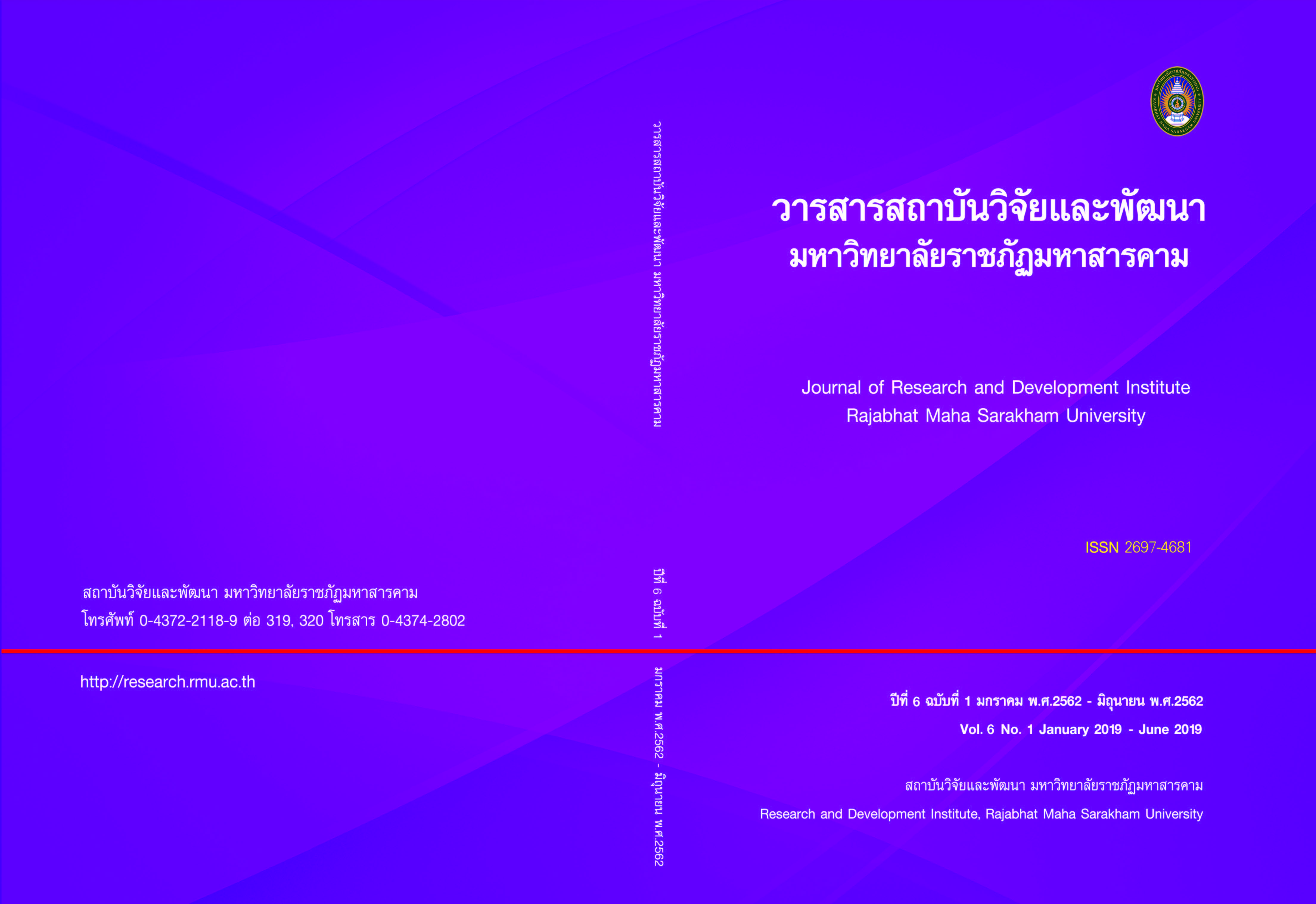Competency Development Model of Network Management of Informal Education and Non-Formal Education in Kalasin, Province
Keywords:
Network, Management, Informal Education and Non-Formal EducationAbstract
This study has three major purposes are to 1) investigate factors affecting network management of informal education and informal education, 2) create network management models of informal education and informal education, and 3) implement and evaluate network management model of informal education and informal education in Kalasin province. The samples were selected from members of informal and informal education networks. Tools used in research to collect information as a form of network management, education, non-formal and informal education 5 steps evaluation questionnaire consistent, and performance appraisal. Statistics used in data analysis were mean, standard deviation, multiple regression analysis and paired t-test.
It was concluded that in the first part ; Independent variables affect network management, informal education and informal education. The variables are selected in the respective equations were 1) teamwork and coordination skills, 2) competency competence, 3) analytical thinking competence, 4) systematic thinking competency, 5) leadership competencies, 6)good communication performance, and 7) change management performance. All variables together predict of network management 86.6%. In the second part ; the network management model in Kalasin Province consists of 5 stages : (1) awareness of need for network/sharing, (2) problem analysis/restoration Plan and create a shared commitment, (3) Plan implementation, (4) Keeping relationship going and evaluation, (5) reflection and learning (APIRE Model), and In the third part ; after development, it was found that network had management capabilities, all in all, increased significantly before development (P-Value <0.001). The mean score was the highest (Mean = 4.73, S.D. = 0.21, Mdn = 4.50-5.00).
References
Cohen, L., Manion, L., and Morrison, K. (2000). Research Methods in Education. 5th edition. London. Routledge/Falmer, Taylor&Francis Group.
Jatuporn Sutthiwiwat. (2011). Learning Network. Documentation of principles and concepts for the operation of non-formal education centers: Non-formal education textbook: Supervisory unit. [in Thai].
Office of the National Education Commission. (2002). Non-formal education management report to promote lifelong education according to the 1999 Act. Bangkok: Technology and Learning Group, Office of Learning Development and Education Network, Religion and Culture. [in Thai].
Office of the Private Education Commission. (2002). Private education in the next decade. Bangkok: Office of the Private Education Commission. [in Thai].
Ogili, E. (2008). Distance Network for Strengthening the Education Movement in Nigerment. [Online] www.iiz-dvv.de/Index.php? Article_id=371&clang=1.
Phichai Phetcharat. (2004). Competitiveness of the Public Sector for Development. Lopburi: Rajabhat Institute Thepsatri. [in Thai].
Pisit Thepkraiwun. (2011). THE DEVELOPMENT OF COLLABORATIVE NETWORK MODEL FOR EDUCATIONAL QUALITY MANAGEMENT IN SMALL SIZED PRIMARY SCHOOLS. Doctor of Philosophy Thesis: Khon Kaen University. [in Thai].
Prime Minister’s Office. (2011). The 11th National Economic and Social Development Plan 2012-2016. Bangkok: Office of the Prime Minister. [in Thai].
Ratchada Kongkaluang. (2007). A study of Bangkok community learning center's needs and guidelines for organizing non-formal and informal education activities. Master's Degree Thesis: Chulalongkorn University. [in Thai].
Sakkarin Chonpracha. (2007). The development of non-formal education training curriculum for teachers in school under Chiengrai Educational Service Office Area 2. Doctor of Education thesis: Srinakharinwirot University. [in Thai].
Shaeffer, S. (1994). Partnerships and Participation in Basic Education: A Series of Training Modules and Case Study Abstracts for Educational Planners and Mangers. Paris : UNESCO, International Institute for Educational Planning.
Somboon Boonranasirirak. (2010). Factors influencing the strengths of network party of schools under the office of the non-formal and informal education. Doctor of Education thesis: Srinakharinwirot University. [in Thai].
Somboon Tanya, Sittisak Julsiripong, Pramual Tanya, Sirinat Jongkulklang, Chayapol Thongphukdee and Lalita Thongphukdee . (2016). “The Development of Learning Network for Teaching According to the Educational Reform in Basic EducationalSchools, NakhonRatchasima” The Golden Teak : Humanity and Social Science Journal (GTHJ.), 22 (1) : January - April 2016 : 14-22. [in Thai].
Somsak Aiumdee, Manit Chaiyagij, Kanchana ngrorangsri and Sumali Chanchalor . (2013). “The Development of the Participative Education Networks System under the Management of Primary Educational Service Area Offices”. Journal of education Naresuan University, 15(5), 216-224. [in Thai].
Thawinee Suphutthikul. (2007). Effects of organizing non-formal education activities based on transformative learning theory on dependence behavior of drug addicts in Drug Dependence Treatment Centers in three Southern provinces. Master of Education Thesis: Chulalongkorn University. [in Thai].
Theera Runchareon. (2002). Conditions and problems of administration and Basic education management of Educational Institutions in Thailand. Bangkok: VT C. Communication. [in Thai].
Thitichaporn Phongjan. (2010). Participation of Network Party in developing Phrao District non-formal and informational education, Chiang Mai Province. Master of Education Administration Degree Thesis: Chiang Mai University. [in Thai].
Downloads
Published
How to Cite
Issue
Section
License
Articles that are published are copyrighted by the authors of the articles







